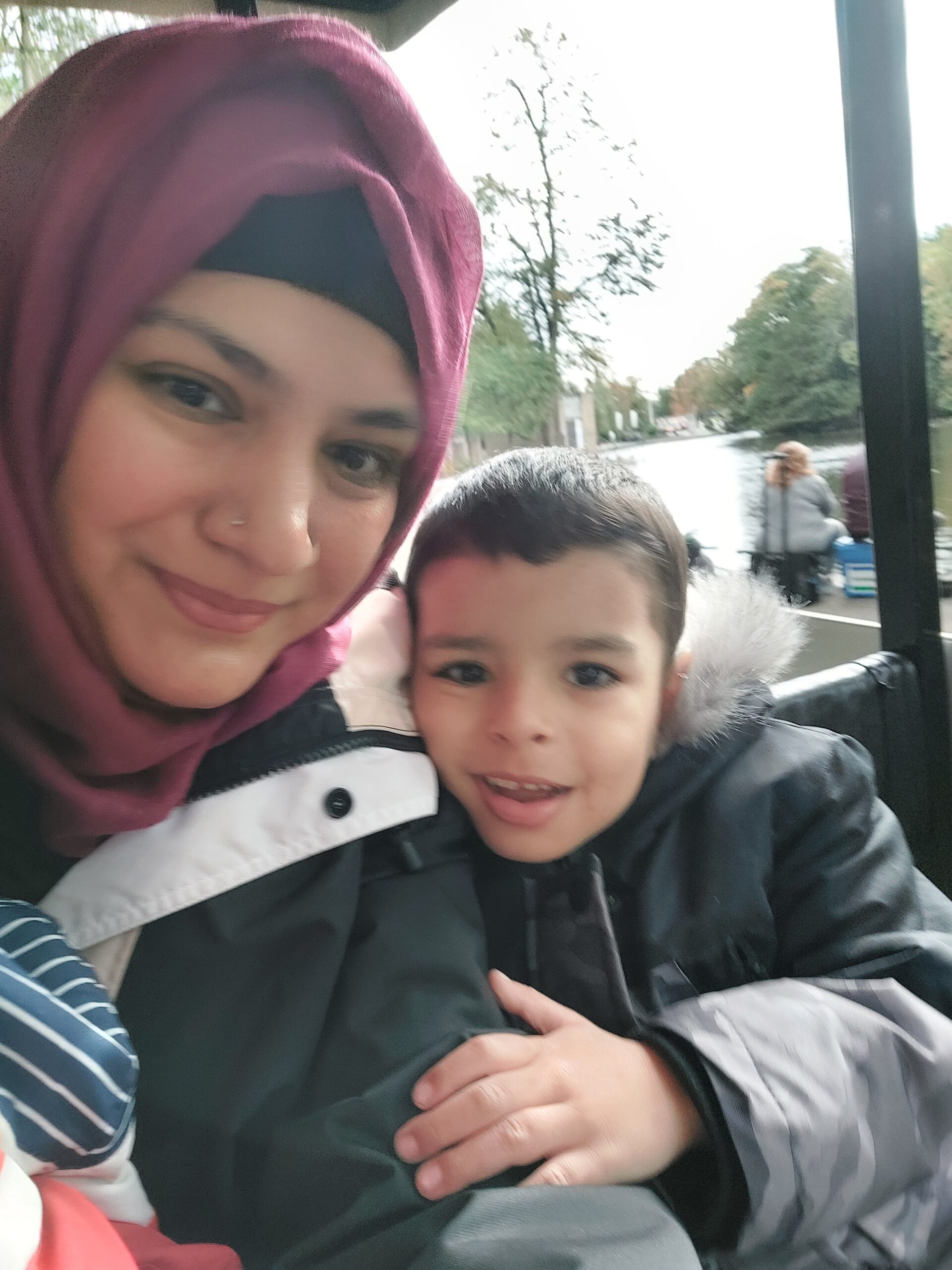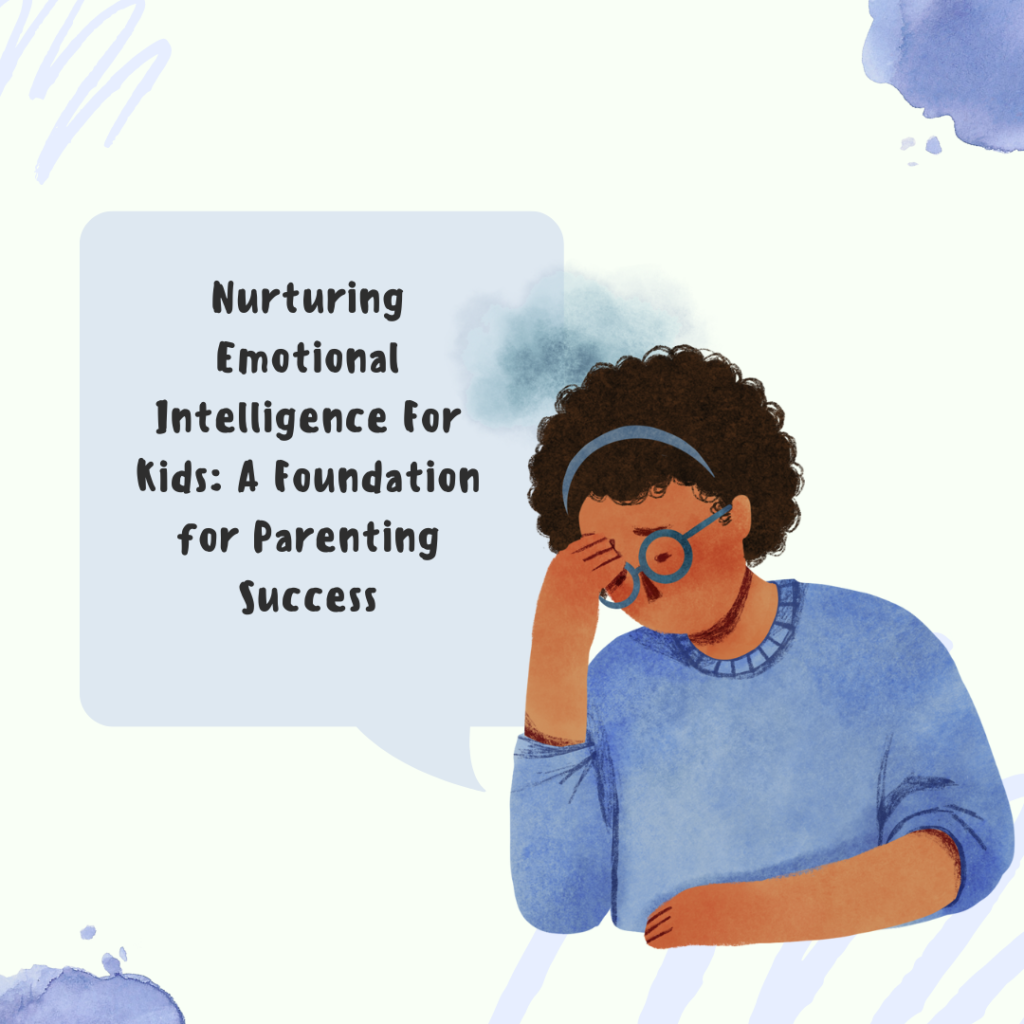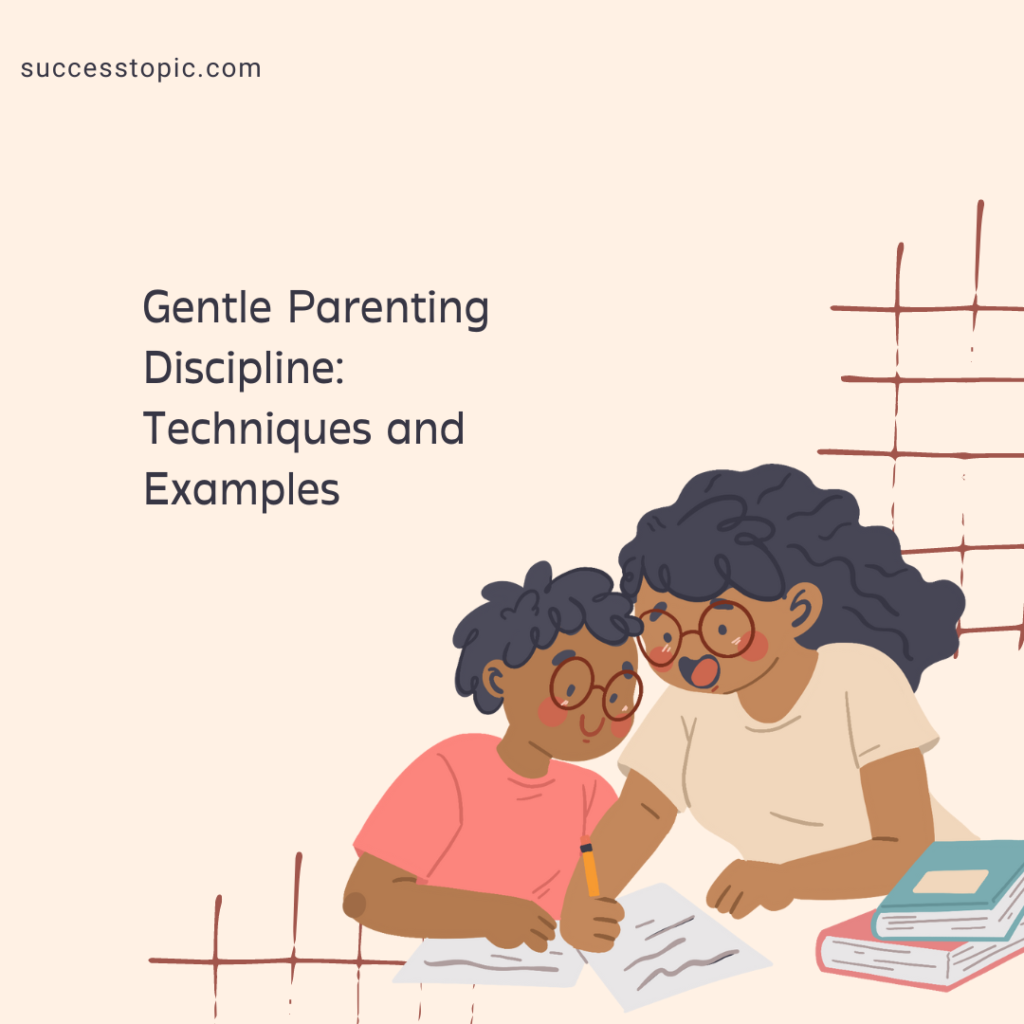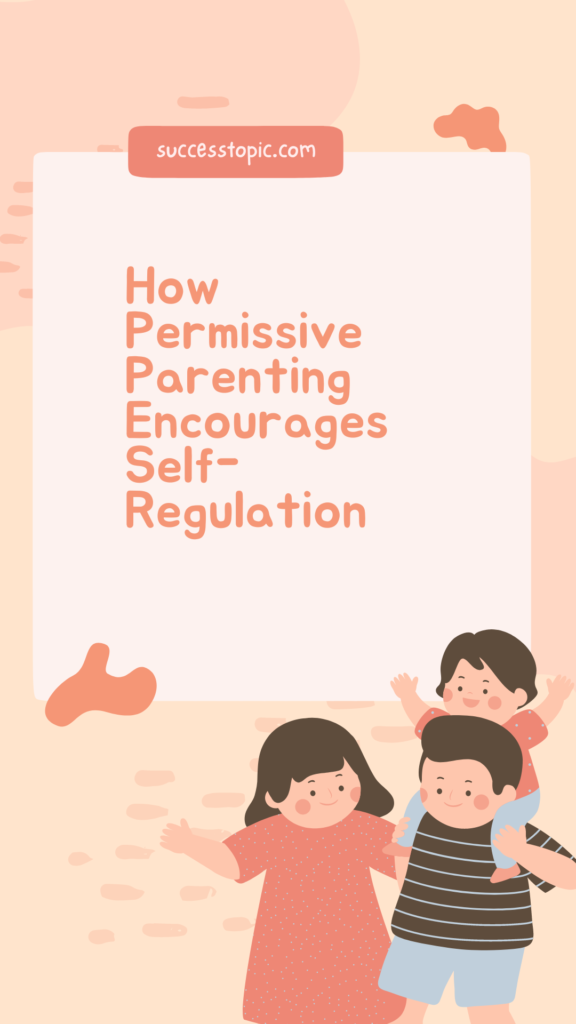
Traditional discipline often conjures images of strict rules, stern punishments, and unwavering expectations. However, permissive parenting offers a different approach to discipline, one that focuses on self-regulation, emotional intelligence, and nurturing. In this article, we will explore how the permissive parenting style redefines discipline and how it can encourage children to develop self-regulation skills.
Permissive Parenting: A Shift in Perspective
A permissive parenting style is characterized by warmth, responsiveness, and low control. By offering an environment of trust and understanding, permissive parents encourage children to take ownership of their actions and develop self-regulation skills. Parents who adopt this approach believe in giving their children freedom and flexibility, allowing them to learn from their own experiences and mistakes.
What is Permissive Parenting?
Permissive parenting is a style of child-rearing that emphasizes positive reinforcement and avoids harsh discipline. It can be contrasted with authoritarian parenting, which uses strict rules and punishments to control children’s behavior; authoritative parenting, which involves setting limits but also encouraging independence; and neglectful or indifferent parenting, in which parents are detached from their children’s lives.
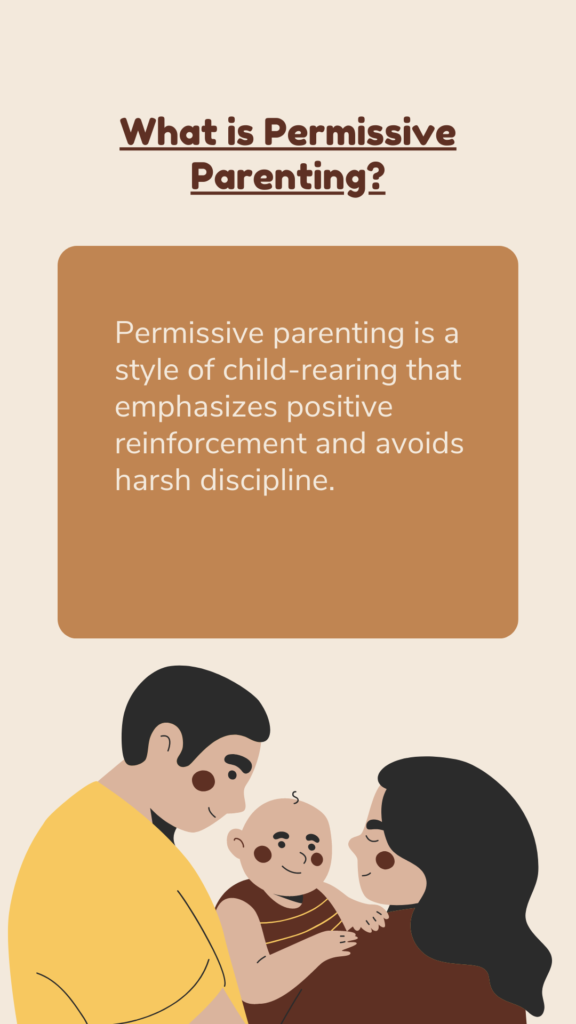
The term “permissive” was first used by psychologist Diana Baumrind in 1967 to describe this approach as one of three distinct styles she identified among parents (the other two being authoritarian and authoritative). In her original study on the topic, Baumrind defined permissiveness as “an attitude toward child discipline that favors no specific disciplinary technique.”
She described permissive parents as those who believe it is better not to impose restrictions on children because doing so may make them feel insecure or guilty; instead, they allow their kids freedom from external control so long as they don’t harm themselves or others–a definition that still holds today despite some refinements over time.
What are the characteristics of the Permissive Parenting Style?
Permissive parenting is one of the four main parenting styles, characterized by a relaxed approach to parenting and a lack of strict rules and discipline.
Here are some of the key characteristics of a permissive parenting style:
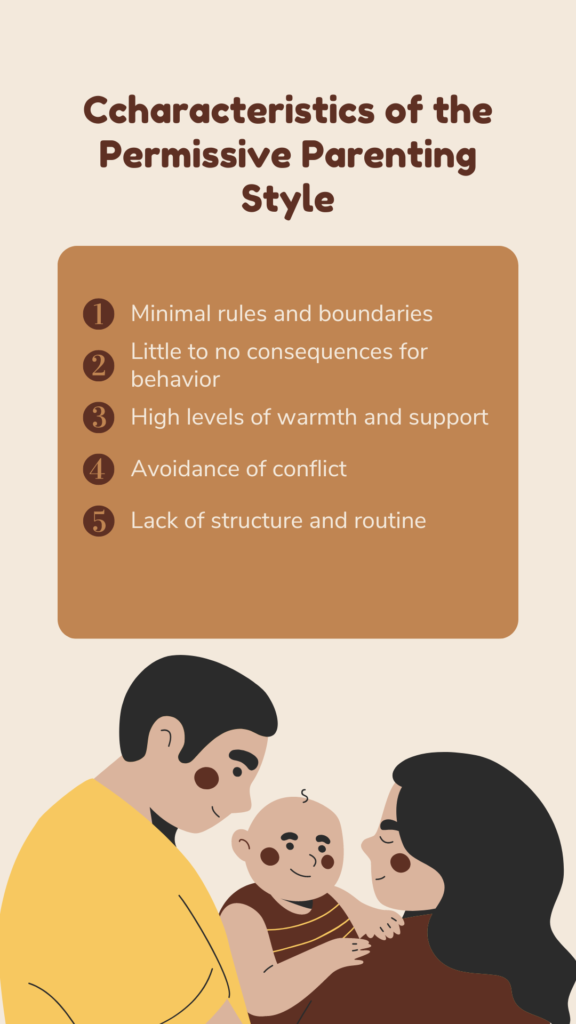
Minimal rules and boundaries
Permissive parents tend to set very few rules and boundaries for their children, giving them a lot of freedom to explore and make their own decisions.
Little to no consequences for behavior
When children break the few rules in place, permissive parents often fail to follow through with consequences, which can lead to a lack of consistency and accountability.
High levels of warmth and support
Despite their lack of strict rules and discipline, permissive parents are often very warm, supportive, and nurturing toward their children.
Avoidance of conflict
Permissive parents tend to avoid confrontation with their children and may give in to their demands to avoid conflict.
Lack of structure and routine
Permissive parenting often involves a lack of structure and routine, making it difficult for children to develop self-discipline and responsibility.
It is important to note that while permissive parenting styles can have some positive aspects, such as encouraging creativity and independence, they can also lead to negative outcomes, such as a lack of respect for authority and difficulty with self-regulation.
What are the Pros/Cons of Permissive Parenting
Permissive parenting is a style of raising children that gives them much independence, freedom, and flexibility. It can be a good fit for some families but has some drawbacks.
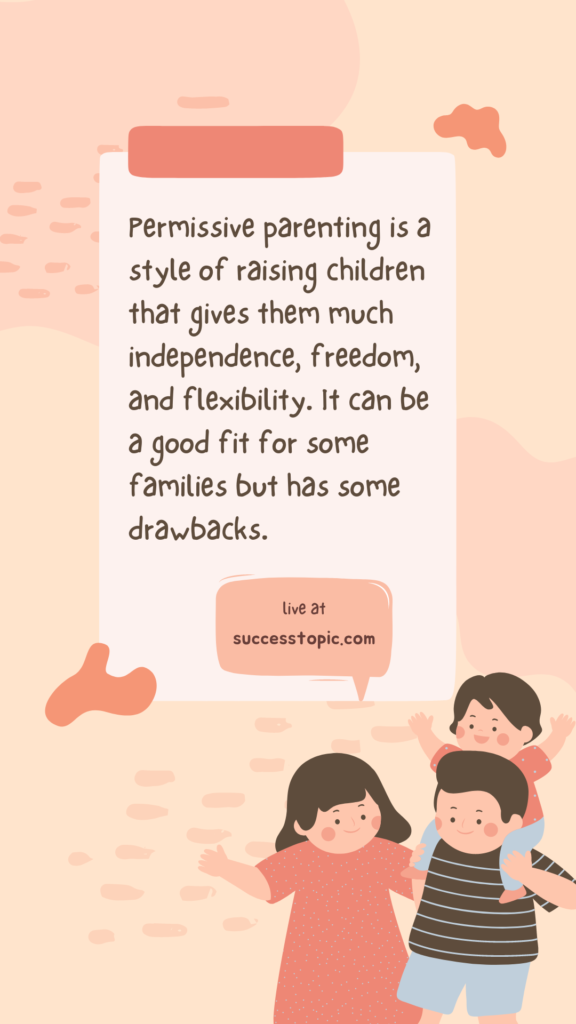
Permissive parents tend to be more lenient with their children than authoritative or authoritarian parents are–they don’t set strict rules for kids or punish them when they break those rules. Instead, they try to ensure their children feel loved and supported in every situation by giving them lots of praise and affection (and maybe even treats).
This type of parenting style can help kids develop self-confidence because they’re given so much freedom; however, permissive parents might struggle at times when setting limits on their kids’ behavior or teaching them how to make good choices without getting frustrated out loud with the child’s actions (which could lead other people around them think negatively about how well they are being raised).
Permissive Parenting Discipline
Permissive parenting style fosters self-regulation by emphasizing the following discipline principles:
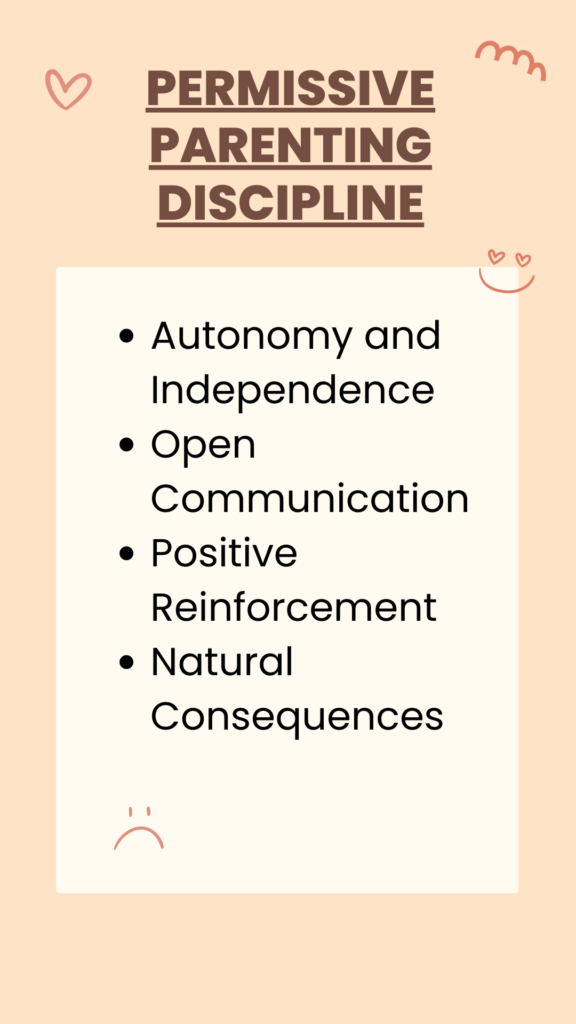
Autonomy and Independence
Permissive parents trust their children to make their own decisions and learn from the outcomes. This freedom to explore and experiment empowers children to develop a sense of responsibility and self-awareness.
Open Communication
Permissive parents maintain open lines of communication, encouraging their children to express their feelings and thoughts without fear of judgment or punishment. This dialogue promotes emotional intelligence and helps children learn to manage their emotions effectively.
Positive Reinforcement
Instead of relying on punishment, permissive parents use praise, encouragement, and rewards to guide their children’s behavior. This approach fosters intrinsic motivation, helping children develop a genuine desire to make good choices and exhibit self-control.
Natural Consequences
Allowing children to experience natural consequences teaches them valuable lessons about responsibility and accountability. Permissive parents provide guidance and support but refrain from shielding their children from the outcomes of their actions.
Should You Practice Permissive Parenting Discipline
By emphasizing self-regulation, permissive parenting offers several long-term benefits for children, including:
Enhanced Emotional Intelligence
Children raised in permissive households develop empathy, self-awareness, and emotional resilience through open communication and emotional support. The role of emotional intelligence in a permissive parenting style is important to consider. Emotional intelligence is the ability to recognize, understand and manage our own emotions as well as those of others. It also includes awareness of our strengths and weaknesses and understanding how our behavior affects others.
Emotional intelligence can be developed through practice, just like other skills such as reading or writing. When children are exposed to emotionally intelligent parents who model good behavior, they will learn from them by observing their interactions with others and practicing what they see at home or elsewhere in their lives outside the home environment (like school).
Development of Empathy
The development of empathy is another aspect related to emotional intelligence that permissive parents should consider when raising their children with this style of parenting style because it helps kids develop compassion for others while teaching them how different people feel about various situations, therefore enabling them to make better decisions when dealing with complex situations later on in life.
Strong Problem-Solving Skills
As children learn to regulate their thoughts and emotions, they become better equipped to navigate challenging situations and solve problems effectively.
Improved Social Skills
Children who can self-regulate are more likely to have successful relationships, as they can empathize, communicate, and cooperate with others.
Permissive Parenting Discipline: The Importance of Boundaries
While permissive parenting discipline encourages self-regulation, balancing freedom and structure is essential. Setting clear boundaries and expectations helps children understand the limits of their autonomy and ensures that their freedom does not compromise their safety or well-being. Permissive parents must be mindful of providing guidance and support while still allowing their children the space to learn, grow, and develop self-regulation skills.
What are the Challenges of the Permissive Parenting Style?
As with any parenting style, there are potential drawbacks to a permissive parenting style. For example, children may have difficulty setting boundaries and fostering healthy relationships with others if allowed to do whatever they want without consequence. They also might struggle with self-regulation due to being given too much freedom at an early age; this can lead to impulsive behavior or poor decision-making skills later in life.
What is the Impact of Permissive Parenting on Children
As you can see, there are many benefits to permissive parenting. However, it’s important to remember that this parenting style isn’t right for everyone and can negatively affect children. For example:
Children who grow up with permissive parents may struggle with developing good social skills because they don’t learn how to navigate conflict or resolve problems independently. They may also struggle academically because they aren’t given enough structure at home or at school.
Research shows that children raised in permissive homes tend to be less resilient than kids raised by authoritative parents–and this is especially true if their parents were overly lenient about bedtimes or chores!
What are the Benefits of Permissive Parenting for Parents
Permissive parenting has a lot of potential benefits for parents. For example, it can help you feel more satisfied with your life and relationships. It also helps to foster stronger communication between you and your child.
Permissive parents are often more accepting of their children’s behavior than authoritarian or authoritative parents because they don’t want to micromanage every aspect of their kids’ lives (or else they would just be authoritarian). This means that when something goes wrong, permissive parents will try their best not to blame themselves or their children but instead look at the situation objectively so they can figure out what went wrong and how they can fix it in the future.
What are the Challenges of Permissive Parenting for Parents
A permissive parenting style can present challenges for parents. According to Dr. Jonice Webb, the challenges of permissive parenting for parents include difficulty in setting and enforcing boundaries and rules, a lack of consistency in discipline, feeling overwhelmed or guilty about the child’s behavior, and struggling to provide structure and guidance for the child’s development. Additionally, permissive parents may have difficulty teaching their children self-discipline, which can lead to problems with self-regulation in adulthood.
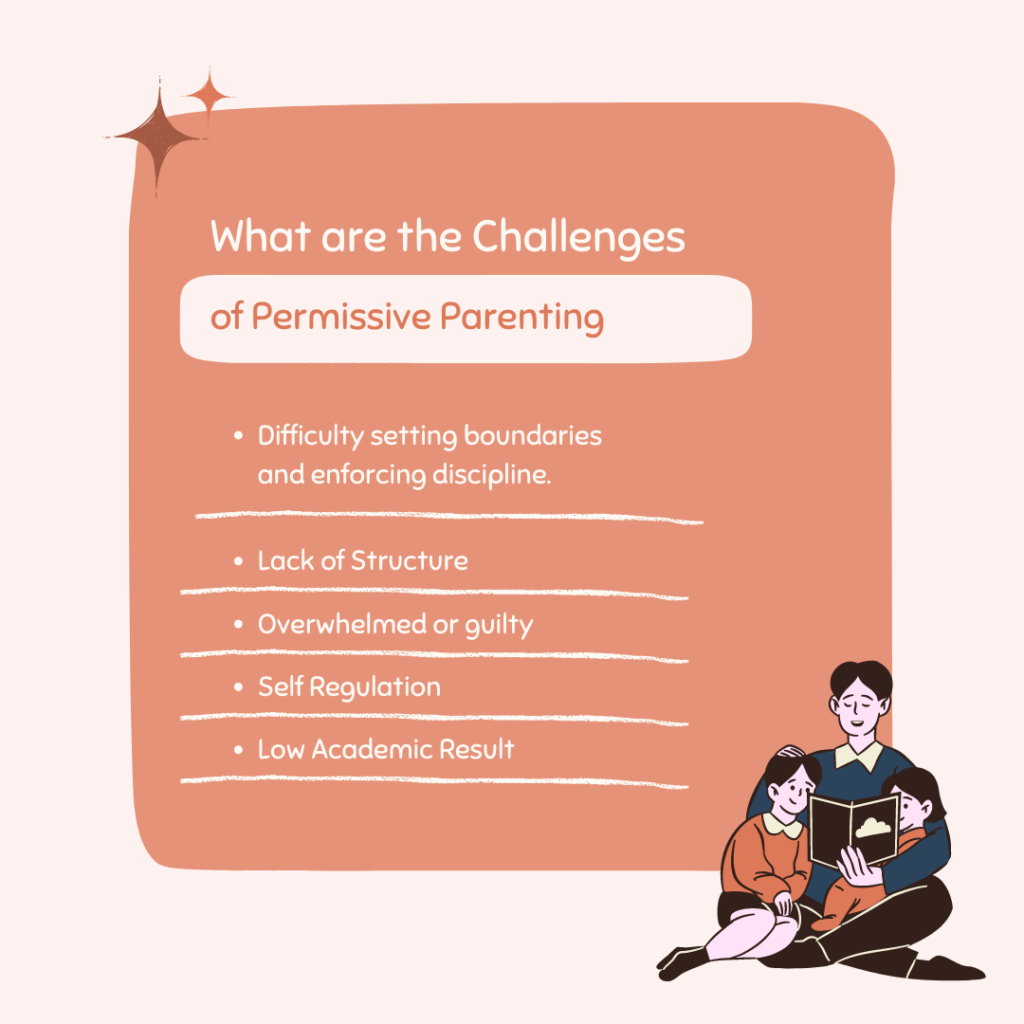
Difficulty setting boundaries and enforcing discipline.
If you’re a permissive parent, it can be hard to draw the line between what’s okay and what’s not. You may find yourself constantly asking your child if they want something or telling them they can do something when they ask–even if it’s not in their best interest or yours. Asking your child if he wants another cookie is fine; letting him eat three or four cookies because he asks is not!
Lack of Structure
Lack of structure and lack of guidance in life decisions (such as career choices). Children raised by permissive parents don’t learn how to make good decisions based on facts rather than feelings; this can lead them down less-than-ideal paths for their future happiness and success as adults.
Overwhelmed or guilty
Permissive parenting can create challenges for parents when it comes to managing their child’s behavior. Since permissive parents tend to avoid confrontation and fail to enforce consequences for negative behavior, they may feel overwhelmed or guilty when their child acts out or misbehaves. As a result, parents may struggle to find ways to discipline their children effectively without feeling like they are being too strict or harsh.
Permissive parents may also feel guilty for not setting more boundaries or rules for their children, which can lead to feelings of inadequacy or self-doubt. They may worry that their child will not learn important life skills or develop the self-discipline necessary to succeed in adulthood.
Self Regulation
Self-regulation is controlling one’s thoughts, emotions, and behaviors to achieve a certain goal. It is an important skill that helps individuals manage stress, cope with challenges, and make positive decisions. However, self-regulation can be challenging for children raised in permissive parenting environments.
Permissive parenting is a parenting style characterized by low demands, high responsiveness, and little to no discipline. Parents who practice a permissive parenting style tend to be lenient and indulgent and allow their children to do as they please. While this approach may seem loving and supportive, it can hinder a child’s ability to develop self-regulation skills.
Children who grow up in permissive parenting environments may struggle with self-regulation because they have not been taught how to manage their impulses, emotions, and behaviors. Instead, they have been allowed to act on their desires without consequence, which can lead to a lack of self-control.
Low Academic Result
Permissive parenting can have a significant impact on a child’s academic performance. Low academic results may result from the lack of structure, discipline, and expectations often associated with this parenting style. The following factors can contribute to low academic results in children raised in a permissive parenting environment:
Lack of self-discipline
Permissive parents may not set clear expectations or enforce consequences for their child’s behavior. As a result, children may struggle to develop self-discipline and time-management skills. This can lead to difficulty completing homework, studying for exams, and staying focused in class.
Low motivation
Permissive parenting often results in insufficient external motivation for children to perform well academically. Parents may not set high expectations or emphasize the importance of education, which can lead to a lack of intrinsic motivation and a laissez-faire attitude toward school.
Poor study habits
Children raised in permissive environments may not receive guidance on developing effective study habits. This can result in poor academic performance as they may not know how to approach learning new material or preparing for exams.
Limited problem-solving skills
Permissive parents may be inclined to rescue their children from challenging situations rather than encouraging them to develop problem-solving skills. This can hinder a child’s ability to tackle academic challenges independently and persist when faced with difficulties.
Lack of accountability
Permissive parents may not hold their children accountable for their academic performance. As a result, children may not feel a sense of responsibility for their grades and may not put in the necessary effort to improve.
Examples and Stories of Permissive Parenting
Permissive parenting is a style where parents are very lenient and allow their children to do what they want without setting limits or imposing consequences for their behavior. This type of parenting can have both positive and negative outcomes.
Here are some examples and stories of permissive parenting:
Examples
Allowing excessive screen time
A permissive parent might let their child watch TV or play video games for hours on end without any limits or rules around when or how long they can use screens. This can lead to a lack of physical activity and social interaction and even impact their sleep.
No consequences for misbehavior
A permissive parent might not discipline their child for misbehavior or bad grades, instead choosing to overlook these issues or brush them off as no big deal. This can lead to a lack of accountability and responsibility and even cause the child to feel unimportant or unloved.
Giving in to every request
A permissive parent might always give their child what they want, even if it means spoiling them or indulging their every whim. This can lead to entitlement, a lack of empathy towards others, and an inability to handle disappointment or delay gratification.
Story
One story of permissive parenting involves a family with a young child who loved sweets. The parents allowed the child to have candy and other sugary treats whenever they wanted without setting any limits or explaining why consuming so much sugar might not be healthy. As a result, the child developed cavities and had several teeth pulled, causing pain and discomfort. The parents then realized the consequences of their permissive parenting and began limiting the child’s candy.
Another example involves a teenager who was allowed to stay out late and party with their friends without any rules or consequences for their behavior. This led to the teenager getting into trouble with the law and struggling in school, as they were constantly tired and unable to focus due to their late nights out. The parents then realized the negative consequences of their permissive parenting and began to set limits on the teenager’s social life and behavior.
Conclusion
Permissive parenting is a style where parents have low expectations but are highly attentive to their children. This parenting style may result in unintended consequences due to the lack of structure and boundaries children need to thrive.
The permissive parenting style redefines discipline by focusing on self-regulation rather than strict rules and punishment. By fostering autonomy, open communication, positive reinforcement, and natural consequences, this parenting style empowers children to take ownership of their actions and learn from their experiences. With the right balance of freedom and boundaries, permissive parenting can help children develop essential self-regulation skills, ultimately leading to emotional intelligence, strong problem-solving abilities, and successful relationships.

